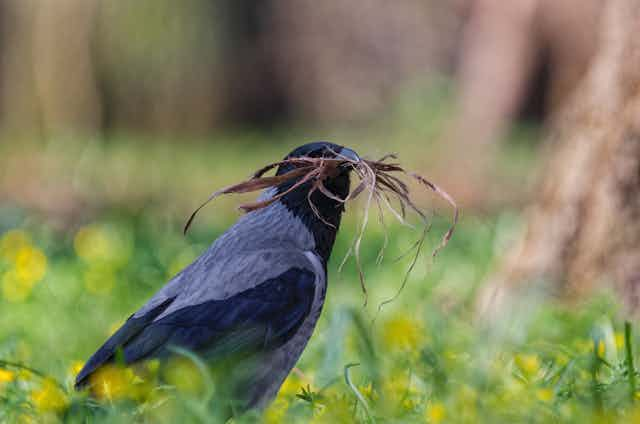Humans aren’t as unique as we used to think. Not, at least when it comes to making plans for the future. Scientists originally thought humans were the only animals that made plans but, over the past decade, studies on non-human primates and the crow family have challenged this perspective.
For example, we’ve seen that these animals are able to store tools for later use, cache food in places where it will be needed the most, and hide pieces of the sort of food they know will be running low in the future.
In all these studies, the animals had to consider what to do, where to do it and when to prepare for certain specific future events. The latest research shows that ravens can indeed anticipate the “what, where and when” of a future event on the basis of previous experiences. But unlike the previous studies, this work tested the birds in behaviour they don’t normally show in the wild. This provides evidence that they have a much more general ability to plan for the future than previously thought.
Food hoarding is common in members of the crow family (corvids) because they often eat from perishable animal carcasses, which provide lots of food but are only available for a short amount of time. To create a suitable cache of food they need to work out what to store, where to put it and when to do so.

The new study, published in the journal Science, tested the birds outside this naturally occurring behaviour, which may have evolved specifically because it gives crows a survival advantage. Some crow species are known to naturally use tools to retrieve food. So the researchers tested whether the birds could store and retrieve a tool so they could get at their food after a gap of 17 hours – something we wouldn’t expect them to do naturally. The scientists didn’t give the birds a chance to learn this behaviour first but they were still able to instantly select the tool out of a number of unnecessary items.
In another experiment, the researchers taught ravens to select a token from a number of items that they could then exchange for food. Again, the birds then showed that they could plan for the future using this new behaviour. They were able to store this token and then retrieve and use it when they were offered the chance to exchange it for food 17 hours later.
This contrasts with all of the previous studies in future planning, which have focused on naturally occurring behaviour. For example, we know that California scrub jays cache their food according to their future needs. And that bonobos, chimpanzees and orangutans select, transport and save appropriate tools for future needs.
General intelligence
These studies have shown that animals can plan for the future – but they left an important question open for debate. Are animals only able to plan to use abilities that have evolved to give them a specific advantage, or can they flexibly and intelligently apply planning behaviour across various actions? Most critics would say the former, as the animals were tested in naturally occurring behaviours.
But the new research provides the first compelling evidence that animal species can plan for the future using behaviour that doesn’t typically occur in nature. This supports the view that at least some cognitive abilities in animals don’t evolve just in response to specific problems. Instead, it suggests that animals can apply these behaviours flexibly across problems in a similar way to humans.
It seems that, in corvids and apes, intelligence is not a system to solve a predefined set of problems (dedicated intelligence) but rather a computational system to improvise new solutions (improvisational intelligence). But it is still unclear what this cognitive system exactly is and how it evolved.
What’s needed now is neuro-biological evidence of general intelligence in animals. We also need to investigate how flexible and improvisational behaviour evolved. Then we might be able to see how crows’ ability to plan for the future fits in with their broader cognitive powers.

